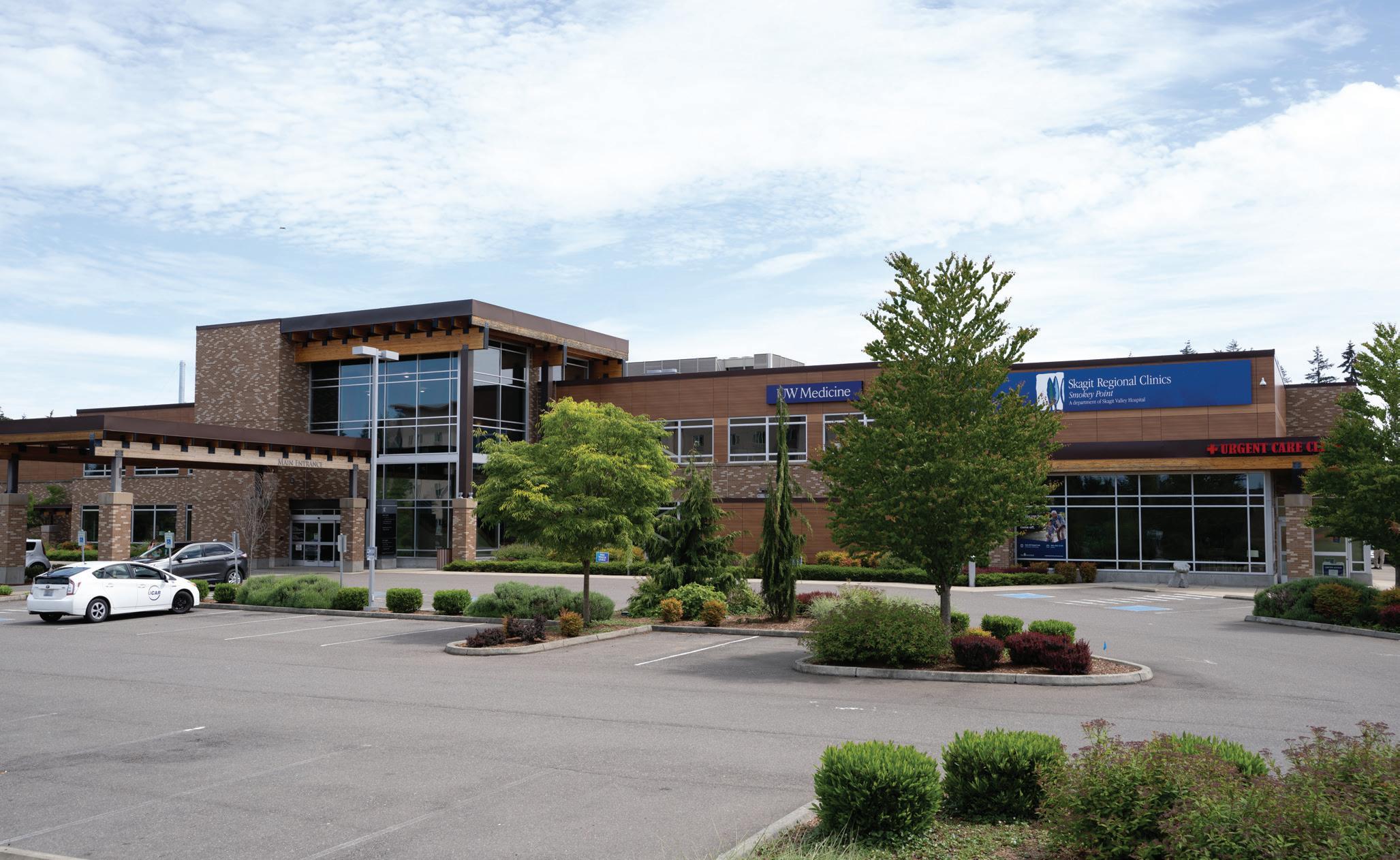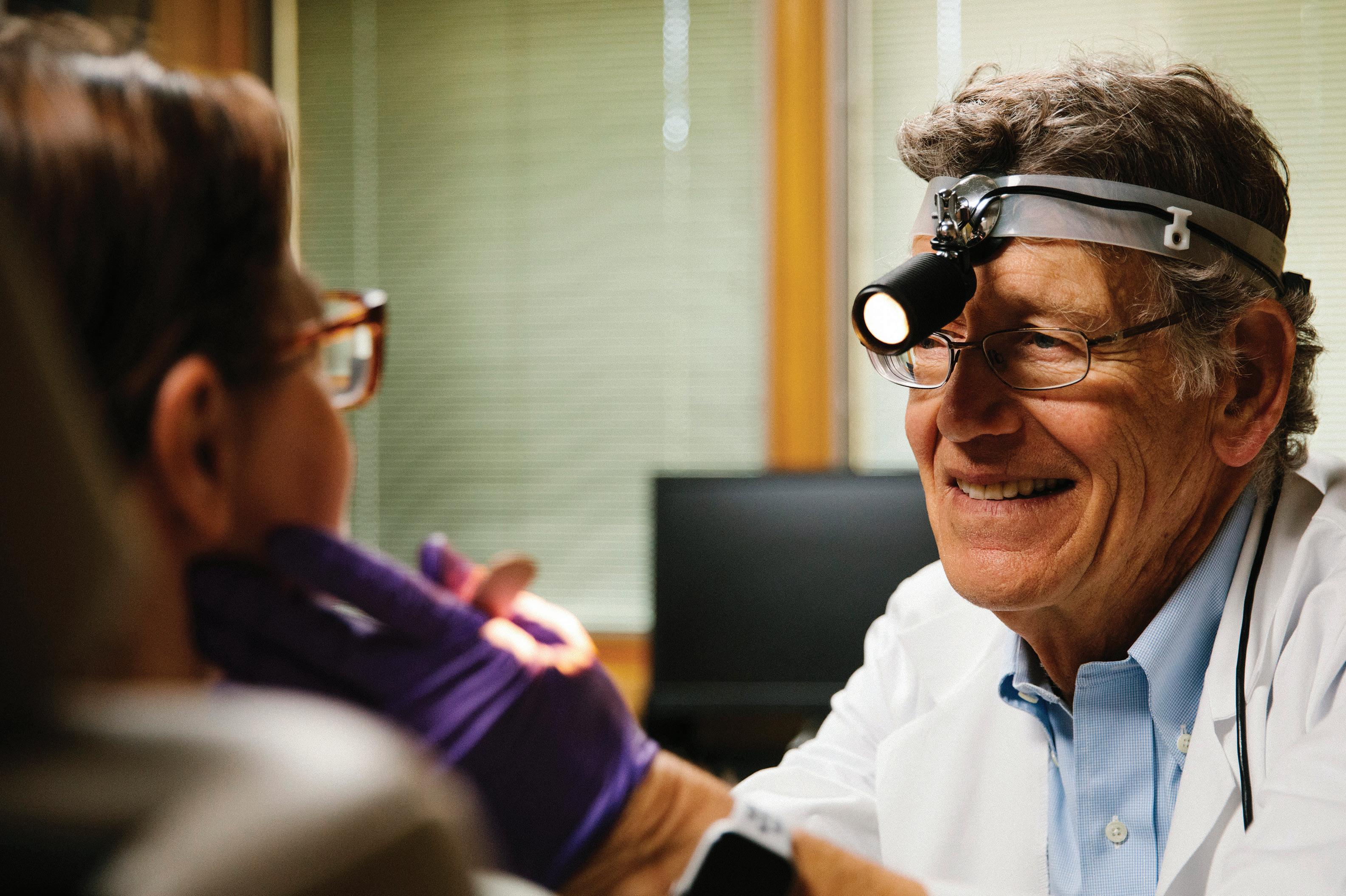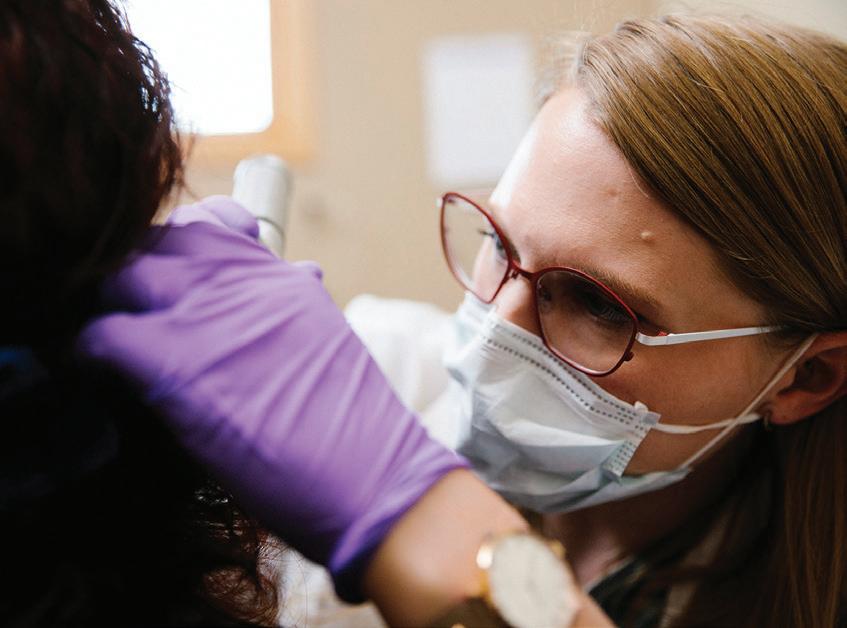
9 minute read
3D mammography
3D breast tomosynthesis has been up and running at the Women’s Imaging Center in Mount Vernon for a full year and was recently added at Cascade Valley Hospital in Arlington. Radiologist Leah Kiviat, MD is impressed every day with the vast improvement the technology is making in identifying potential cancers with 3D mammography.
“I am still amazed at the cancers we are seeing, it is really incredible,” said Dr. Kiviat, who is with Skagit Radiology and serves as the Women’s Imaging Center Medical Director. “It’s even better than we anticipated and it’s still amazing to me every day.”
A 3D mammogram combines several breast X-rays to produce a three-dimensional image of the breast, offering more detail and precision that previous 2D technology. 3D technology generates highresolution images of the breast, improves detection of cancer, works well for women with denser breast tissue, lessens the uncomfortable compression time and lowers the number of recalls for additional tests.
As the technology shows even smaller cancers for early detection, patients may not require the invasive treatments often connected to breast cancer.
“A lot of these are treatable or curable and many women may not even need extensive treatment,” Dr. Kiviat said. “The important thing for women to do is to have a screening mammogram. Just go do it. We know it can be anxiety provoking, and we understand. We will walk our patients through it. So many women often say ‘that wasn’t so bad’ and they are happy they got it done.”
For those who require surgery, radiologists and surgeons at Skagit
Regional Health are now using a breast seed implant to localize the tumor. The procedure, which can be done as much as a month before surgery, involves implanting a tiny seed into the breast that responds to a radio frequency. When it’s time for the procedure, the surgeon will use the responsive seed to locate the tumor. The seed implant process replaces the prior wire-guided localization procedure and is an advancement that will improve care and comfort for the patient, Dr. Kiviat said. The Women’s Imaging Center and the Skagit Imaging Pavilion serves as a central location for comprehensive diagnostic imaging modalities to benefit patients. If a patient is facing a potential cancer diagnosis, additional tests including breast ultrasound, biopsy and breast MRI, are offered in the same convenient location.
If a diagnosis of cancer is made, the patient will be provided with a seamless hand off to The Breast Institute program at the Regional Cancer Care Center. This patient navigator based program provides wrap-around support for the newly diagnosed patient. The navigator guides patients through the cancer care system to ensure timely care, comprehensive treatment and support through every aspect of their journey. The patient navigator serves as the patient’s go-to person for all questions and concerns, offering guidance and assistance from the beginning of cancer care throughout the entire treatment plan and into survivorship.
Schedule your mammogram today!
October is Breast Cancer Awareness Month, a perfect time to schedule a mammogram for early detection. Skagit Regional Health now offers 3D breast tomosynthesis in Mount Vernon and Arlington.
MOUNT VERNON In Mount Vernon, call the Women’s Imaging Center at 360-428-7275 or 1-888-371-2812.
The Women’s Imaging Center will offer special Saturday hours from 8 a.m. to 3 p.m. on October, 17, 2020.
ARLINGTON In Arlington, call the Cascade Valley Hospital Diagnostic Imaging Department at 360-435-0515.
Extended hours for mammograms will be offered every Wednesday evening in October with the last appointment at 6 p.m. Fall 2020 9 9
It’s flu season and COVID-19 continues: Be prepared
The Fall flu season approaches as the COVID-19 pandemic continues. The Centers of Disease Control (CDC) notes, “Because of the COVID-19 pandemic, reducing the spread of respiratory illnesses, like flu, this fall and winter is more important than ever.” The CDC states getting a flu vaccine is very important in helping to protect yourself, your family and the community from the flu.
The CDC offers the following information on the similarities and differences between the flu and COVID-19:
Similarities:
Both COVID-19 and flu can have varying degrees of signs and symptoms, ranging from no symptoms (asymptomatic) to severe symptoms. Common symptoms that COVID-19 and flu share include: • Fever or feeling feverish/chills • Cough • Shortness of breath or difficulty breathing • Fatigue (tiredness) • Sore throat • Runny or stuffy nose • Muscle pain or body aches • Headache • Some people may have vomiting and diarrhea, though this is more common in children than adults
Differences: FLU • Flu viruses can cause mild to severe illness, including common signs and symptoms listed above. • For more information on flu symptoms, go to www.CDC.gov/flu/ symptoms
COVID-19 • Other signs and symptoms of
COVID-19, different from flu, may include change in or loss of taste or smell. • For more information on COVID-19 symptoms, go to www.CDC.gov/ coronavirus/2019-ncov/symptomstesting The CDC recommends people take precautions to prevent illness: 1. Take time to get a flu vaccination.
The CDC recommends a yearly flu vaccine as the first and most important step in protecting against the flu virus. 2. Take everyday preventive actions to stop the spread of germs. • Wear a mask • Maintain social distancing with a separation of at least six feet from other people • Limit exposure to people outside of your household • Avoid large gatherings • Avoid contact with sick people • Stay home from work if you have symptoms • Avoid touching your eyes, nose and mouth • Wash hands frequently and thoroughly (two verses of “Happy
Birthday” is the right duration) • Clean and disinfect surfaces and objects – at home and work – that may be contaminated with germs
Flu vaccination can reduce flu illness, doctor’s visits, and missed work and school due to flu, as well as prevent flu-related hospitalizations.

In November, Skagit Regional Health will expand services at the Smokey Point clinic previously shared with UW Neighborhood Clinic. The 40,000-square foot building is located at 3823 172nd Street NE in Arlington and features primary care, urgent care, a variety of specialties, imaging and cancer care.
The facility opened in 2011 and since January 2016 has been a partnership between UW Neighborhood Clinics and Skagit Regional Health. Leaders with both organizations state that they believe patients will be well served by having local management of the entire clinic.
“We are building strong relationships with patients in north Snohomish County and are very pleased to once again take on full operations of this clinic and expand services for the people of the community,” said Brian Ivie, Chief Executive Officer of Skagit Regional Health. “We are fully committed to providing excellence in primary and specialty care to continue to meet the needs of our patients.”
For the past five years, Skagit Regional Health has provided urgent care, cancer care and specialty services. The organization will now expand to primary care in this conveniently located, modern facility.
Many familiar faces will remain in the clinic as Skagit Regional Health offered opportunities for continued employment to all UW Neighborhood Clinic staff and providers who want to remain with the clinic after the transition.
The UW Maternal Fetal Medicine Clinic, located on the second floor, will remain in operation at the facility, offering highly specialized care for women with health conditions or special challenges that may complicate pregnancy and birth. It is open from 8 a.m. to 5 p.m. Monday through Friday and can be reached by calling 844-657-4532.
The ongoing partnership between UW Medicine and Skagit Regional Health remains strong and the two organizations will continue to collaborate on healthcare strategies. In 2015, the two organizations signed a long-term clinical affiliation agreement to allow for joint partnerships and ventures to meet the healthcare needs for the north Snohomish community.
In north Snohomish County, Skagit Regional Health also operates Cascade Valley Hospital in Arlington and a variety of clinics in Arlington, Marysville, Stanwood, Granite Falls and Darrington.
DERMATOLOGY: 360-814-6800 Monday - Friday 8 a.m. - 6 p.m.
DIAGNOSTIC IMAGING: 360-428-2168
ENDOCRINOLOGY: 360-814-6315
GENERAL SURGERY: 360-435-6097 Wednesday and Thursday 8 a.m. - 5 p.m.
LAB: 360-657-8713 Monday - Friday 7:30 a.m. - 7:30 p.m. Weekends 8 a.m. - 4 p.m.
NEUROLOGY: 360-428-2550
OCCUPATIONAL MEDICINE: 360-657-8700 Monday - Friday 8 a.m. - 4:30 p.m.
ORTHOPEDICS AND SPORTS MEDICINE AND FOOT AND ANKLE: 360-435-6641 Monday - Friday 8 a.m. - 4:30 p.m.
PLASTIC AND RECONSTRUCTIVE SURGERY: 360-428-2500 Available on Fridays
PRIMARY CARE: 360-428-2500 Monday - Friday 8 a.m. - 4:30 p.m.
RHEUMATOLOGY: 360-428-2550 Monday - Friday 8 a.m. - 5 p.m.
URGENT CARE: 360-657-8700 Monday - Friday 7:30 a.m. - 7:30 p.m. Weekends 8 a.m. to 4 p.m.
DIVISION STREET CLINIC OPENS Skagit Regional Health – Division Street Clinic opened in September. The building, located at 1801 E. Division Street in Mount Vernon, has been the home of several independent clinics in the past and will be home to Skagit Regional Health Internal Medicine providers. As of September, Madeline Button, PA-C and Alexa Celerian, DO will see patients at SRH – Division Street Clinic for routine check-ups and screenings as well as acute illnesses or injuries. The phone number for the Division Street Clinic is 360-814-2980.

Cascade Ear, Nose and Throat joins Skagit Regional Health system, offices in Mount Vernon and Anacortes

OTOLARYNGOLOGISTS:

• Gary Brown, MD • Christopher England, MD • James Gross, MD • Kevin Harris, MD • Gary Johnson, MD To make an appointment in Mount Vernon, call 360-336-2178 or Anacortes call, 360-588-8985.
Cascade Ear, Nose and Throat joined Skagit Regional Health in July. A well-established specialty group of physicians, Cascade Ear, Nose and Throat has served the communities of Mount Vernon and Anacortes for more than 40 years.
The five highly skilled physicians continue to provide compassionate and personal care, offering diagnosis and treatment, including surgery, for a full continuum of ear, nose and throat conditions.
“This is an exciting growth opportunity for Skagit Regional Health,” said President and Chief Executive Officer Brian Ivie. “We are adding highly skilled and specialized clinicians and staff to our system. This expertise expands and enhances the healthcare options for our communities.”
Existing patients with Cascade Ear, Nose and Throat continue to see the same familiar faces at their appointments at the same locations in Mount Vernon (118 S. 12th Street) and Anacortes (1019 24th Street, Suite B).
Otolaryngologists Gary Johnson, MD, Gary Brown, MD, James Gross, MD, Kevin Harris, MD and Christopher England, MD continue to practice in the Mount Vernon and Anacortes offices. Both facilities retained the same office hours after the transition.
In a letter to patients, the physicians said “This partnership with Skagit Regional Health will expand the healthcare services that we provide for our patients. We look forward to continuing to provide your ear, nose and throat healthcare.” See physician biographies on pages 13 and 14.








